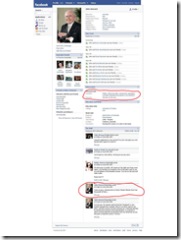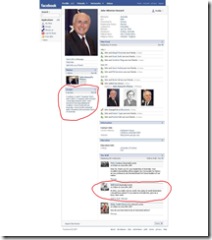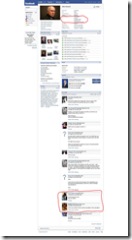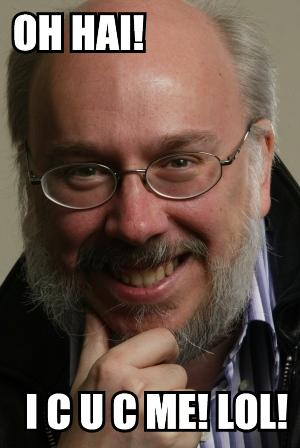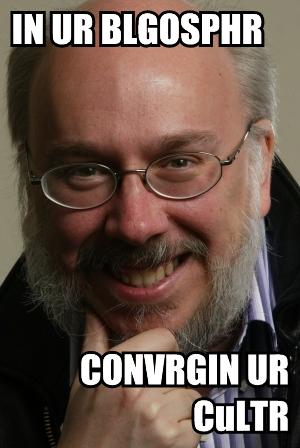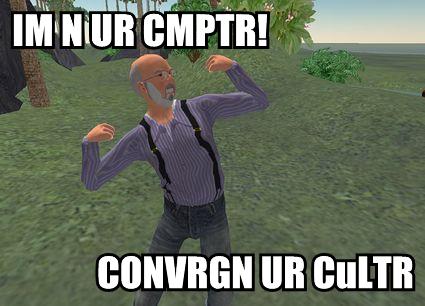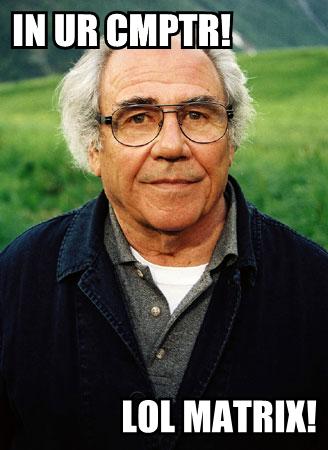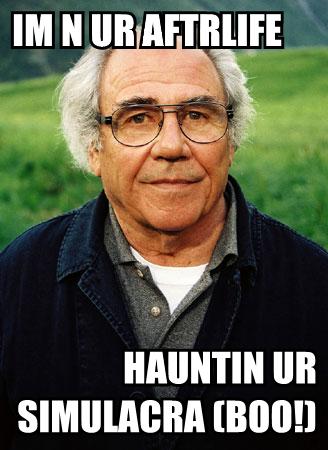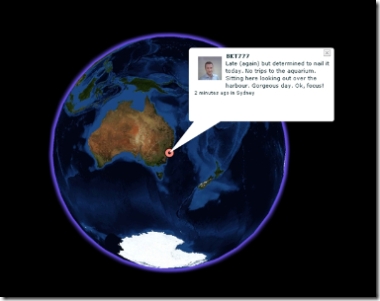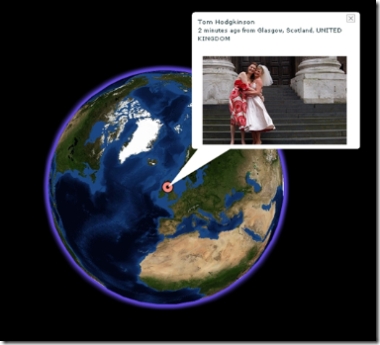Home » participatory culture (Page 17)
Category Archives: participatory culture
Australian Politicians on MySpace this week…
The Australian ran a couple of stories today about Australian politics finding another outlet in MySpace’s ‘Impact’ website (the Australian version).
In Nicola Berkovic’s ‘Kevin has more ‘friends’ than John’, she points out that Labor is doing much better in MySpace than the Liberal Party. As Berkovic notes:
Yesterday afternoon, the Opposition Leader had more than 800 friends, while the Prime Minister had a measly seven. And most of them were fellow Liberal MPs. However, it is also a risky strategy for politicians, who are used to their minders having some degree of control over their image and political message. […]
Many of Mr Rudd’s MySpace friends are preoccupied with the issues that interest many young people: drinking, smoking and sex. […] However, Mr Rudd said, provided that people did not post defamatory or profane comments on his site, he was relaxed about losing control over his image on the internet. “It’s just life in the fast lane,” the Opposition Leader said.
I’d say Kevin Rudd’s attitude is probably a sensible one (and its not like any of the politician on MySpace are actually likely to see their own profiles). That said, in ‘MPs cast cyber net in hunt for votes’, Cath Hart points out that:
The emergence of e-campaigning in Australia is set to mirror the trend in the US, where presidential candidates have embraced the internet – for fundraising and profile building – as the 2008 race moves into full swing. Speaking at the launch of MySpace’s new political channel, Impact, yesterday, Mr Rudd described the site as the “public meeting place for the 21st century”, where his goal is “to get 50per cent … plus one more friend than Mr Howard”. “It’s a good shot in the arm for Australian democracy to keep it alive into the next century.” […]
But media and internet experts have warned Mr Rudd and the swag of other “e-MPs”, or online politicians, that social networking sites can be a double-edged sword. Internet networking expert Joanne Jacobs said the sites offered access to the “student market” of people under 24. “The trouble with these networking sites is that … they open the writer up to criticism. It also means you don’t have a moderating path to vet out unpopular comment,” she said.
Following Joanne Jacobs’ comments, I suspect the real test of Rudd’s take on social networking websites will come when he does something massively unpopular and has to deal with the backlash!
For today, thought, lets look at MySpace friends:
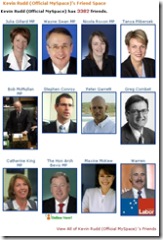 Labor leader Kevin Rudd, has 3382 friends;
Labor leader Kevin Rudd, has 3382 friends;
 Julia Gillard (Deputy Leader for Labor) has 687 friends.
Julia Gillard (Deputy Leader for Labor) has 687 friends.
In the middle, Bob Brown (leader of the Greens) has 173 friends, while Democrat Senator Andrew Bartlett has 163 friends (although, already being Australia’s most web2.0-savvy politician, Bartlett already blogs extensively and has clearly stated that he only has time to treat MySpace as a re-posting space for his blog);
 Meanwhile, Australian Prime Minister John Howard only has 8 friends (and Peter Costello, oddly enough, isn’t one of them!). While the generation gap is clearly one factor, I strongly suspect that Howard’s camp simply aren’t checking friend requests (and thus Howard will probably never have more than 8 friends!). This is similar to what Jill mentions about politics in Norway, in that candidates are using online networks like MySpace or YouTube without having teams literate in how these websites actually work. (Another argument for the importance of digital literacies right there!)
Meanwhile, Australian Prime Minister John Howard only has 8 friends (and Peter Costello, oddly enough, isn’t one of them!). While the generation gap is clearly one factor, I strongly suspect that Howard’s camp simply aren’t checking friend requests (and thus Howard will probably never have more than 8 friends!). This is similar to what Jill mentions about politics in Norway, in that candidates are using online networks like MySpace or YouTube without having teams literate in how these websites actually work. (Another argument for the importance of digital literacies right there!)
Incidentally, the popularity of certain politicians doesn’t seem to be rubbing off on the youth arms of either major party: on MySpace the Young Liberals currently have 50 friends while Young Labor isn’t doing much better with 110 friends.
Returning to Australian Politics on Facebook discussed last week, Kevin Rudd is up to 1296 friends, while there still doesn’t appear to be a real John Howard. I’ll leave you to draw your on conclusions on that front!
(All friend counts and screenshots were taken between 3pm and 3.40pm Perth Time on 13 July 2007.)
Five Second Films!
I confess, I’m addicted to short, sharp edits that are representative of whole films. The ‘Re-Enacted in 30 seconds with bunnies” series, but I think I’ve not found a new addiction … the 5 second film. So far, my absolute favourite is the 2001: A Space Odyssey re-cut:
But, I must admit, the Fargo effort is pretty funny, too:
What’s your favourite?
Facebook and Australian Politics?
Over the past month I’ve suddenly seen Facebook grow from an oddity to something on which the majority of my university-based friends appear. Since I spent some of yesterday pondering the oddities of US politics and digital culture, I thought I’d spend a little of today looking at Australian politics. For those of you not in the know, Australia has what amounts to a two-party political system, divided between Liberal (close to Republican/Tory parties) and Labor (close to the Democrat/UK Labor parties); the Liberal party is led by John Howard, who is our current Prime Minister, while the Labor party, after many years of leadership ambiguity, is led by Kevin Rudd.
Unlike the US (and a lesser extent the UK), mainstream press and politics in Australia really hasn’t embraced either the blogosphere or social networking as a means of promotion or gaining support (and Australian politicians can’t and don’t fund-raise in the explicit way US politicians do). That said, younger voters are clearly looking for some sort of connection with the political sphere, even if its not done through the same rhetoric of civil participation that comes through the US education and advocacy systems. So, that said, is either Australia’s Prime Minster or his Labor rival on Facebook? The answer, initially, appears yes to both, although after some scrutiny, the answer changes to yes for Rudd and no for John Howard – there are, in fact, three Howards, but all are fake.
Of the three Howards, two are obvious fakes, while one is more subtle, but still not authentic. Since this is a fun moment to think about digital literacy, I’ve taken screenshots of the three Howard profiles and circled in red the most obvious indicators that these aren’t authentic pages.
and John Howard #3 …
In contrast, Kevin Rudd’s Facebook page is rather dull, but clearly authentic. (I’ve just made a friend request, so if there’s anything exciting in friends-only land, I’ll write a little more.) It is worth noting that comments which cast John Howard as a sexual or ‘hot’ figure are unambiguously meant to be satirical, in contrast to the clips from the US mentioned yesterday which, while playful, aren’t necessarily ironic (although they might be, especially Hott4Hill).
Putting the Sex (back) into American Politics?
The process by which different US Democrats and Republicans vie for the right to be their party’s candidate for presidency has always fascinated me (admittedly, from afar, safe in the knowledge I don’t need to vote for any of these people). The race for 2004 bought out some impressive efforts in participatory culture (remember Jib Jab’s ‘This Land’?), and this years’ Hillary 1984 video promised more in the race for 2008. While the creativity is definitely out there, one trend which has been a little unexpected is the “I’ve got a crush on…” videos attached to the Democrat candidates.
First there was the self-styled ‘Obama Girl’ with her “I’ve Got a Crush on Obama” video:
The clip and the Obama Girl herself have gained a fair amount of attention in US media, most of which is linked to from Obama Girl’s website. The girl in the clip – Amber Lee Ettinger – didn’t create the concept (or sing the song; she’s lip-synching) but has become one of the key faces in Obama’s campaign. The story behind Obama Girl is found at the Barely Political website. Now, along similar lines but a little more disturbingly, Chuck Tryon has drawn my attention to the “Hott4Hill featuring Taryn Southern” clip, which runs a fine line between representing Hillary Clinton as a politician or a sexual icon(!):
And, of course, there’s a Hott4Hill blog to emphasise Taryn Southern’s efforts.While I’m still thinking about how all of this works (and wonder if these clips have the potential to damage campaigns as much as make them appealing for younger proto-voters) you might want to have a read of ‘The Power and Playfulness of Parody: Obama, Hip Hop and Misunderstanding’ by Bernie Heidkamp in Pop Politics which gives some context and perspective to the Obama Girl clip.
More LOL Theorists, Now with Self-Reflexivity!
I am more than litte pleased to see my two LOL Therorist Henry Jenkins pictures have come to Henry’s attention and he’s actually reposted them in his own blog!
Of course, that couldn’t possible be the end of the circle, so …
Make sure you continue to tune in to LOL Theorists for all the academic hijinx; or, if you’re really busy, perhaps just check out the Henry Jenkins channel! 🙂
LOL Theorists
In a fit of silliness, I find myself using the LOL CATS builder for terrible, terrible, theorist humour …
Where did this insanity come from? I blame Jean (Burgess, not Baudrillard!). (More here.)
Update: Henry Jenkins linked to the LOL Theorist mashups of himself! 🙂
Academic Ethics, Privacy and Transparency … all coming soon to YouTube!
Australia’s QUT has been in the grip of a very public controversy recently which dovetails between issues of freedom of speech, academic ethics and the transparency of university processes. The controversy came to light and media attention on 11 April this year when two QUT academics, John Hookham and Gary MacLennan, published an article in The Australian entitled ‘Philistines of relativism at the gates’. In it, Hookham and MacLennan very publicly took issue with the ethics of work being done by PhD candidate, Michael Noonan:
A time comes when you have to say: “Enough!”, when you can no longer put up with the misanthropic and amoral trash produced under the rubric of postmodernist, post-structuralist thought. The last straw, the defining moment, came for us when we attended a recent PhD confirmation at the Queensland University of Technology, where we teach. Candidate Michael Noonan’s thesis title was Laughing at the Disabled: Creating comedy that Confronts, Offends and Entertains. The thesis abstract explained that “Laughing at the Disabled is an exploration of authorship and exploitation in disability comedy, the culmination of which will be the creation and production (for sale) of a six-part comedy series featuring two intellectually disabled personalities. “The show, entitled (Craig and William): Downunder Mystery Tour, will be aimed squarely at the mainstream masses; its aim to confront, offend and entertain.” (Editor’s note: the subjects’ names have been changed to protect their privacy.) Noonan went on to affirm that his thesis was guided by post-structuralist theory, which in our view entails moral relativism. He then showed video clips in which he had set up scenarios placing the intellectually disabled subjects in situations they did not devise and in which they could appear only as inept. Thus, the disabled Craig and William were sent to a pub out west to ask the locals about the mystery of the min-min lights. […]
At the seminar we were told there was a thin line between laughing at and laughing with. There is no such thin line. There is an absolute difference that anyone who has been laughed at knows. We must admit with great reluctance that at the seminar we were alone in our criticism of the project. For us, it was a moment of great shame and a burning testimony to the power of post-structuralist thought to corrupt. It is not our intention here to demolish the work of Noonan, an aspiring young academic and filmmaker. After all, ultimate responsibility for this research rests with the candidate’s supervisory team, which included associate professor Alan McKee, the faculty ethics committee, which apparently gave his project total approval, and the expert panel, which confirmed his candidacy. […]
What we have instead is the reality that cultural studies is in the grip of a powerful movement that we call the radical philistine push. It is this same movement that has seen the collapse of English studies and the consequent production of graduates who have only the scantiest acquaintance with our literary heritage. It is also undermining the moral fabric of the university.
So, what starts with ethical questions about a particular thesis, quickly becomes a much more generic complaint about the corruption of education by poststructuralist and postmodern theory and approaches. I know nothing of the people writing or mentioned in this article, but have to say after reading the piece I wasn’t swayed; my sympathies were more with Michael Noonan than anyone else, because as a PhD candidate I know I would have been almost destroyed by such public denouncing of my work. This, I should add, is not a comment on the quality on the work being or proposed – I know nothing beyond the article above and the surrounding debate, and haven’t seen any of the footage mentioned – but rather a comment on the process and the reasonable expectation that any criticism of a candidate’s work be handled within the university as long as possible. I’m not saying there is never a case for ‘going public’ with dismay about certain research, but from what I’ve read I believe Hookham and MacLennan took that step far too early. More to the point, combining criticism of a specific project with a very generic attack on a particular body of theory and its influence on teaching seems a less than generous way of dealing with the work of a PhD candidate.
The issues raised here also beg serious questions about transparency and universities. There is a lot of talk about the need to transparency of research outcomes since (most) Australian universities are at least partially publicly-funded. I quite agree with that notion. However, I think the idea of the processes of a university being taken public under the rubric of transparency tend to skew what makes it into the public arena. Selectively releasing aspects of a process (such as an ethics review process and confirmation of candidature) around research which clearly relies on careful contextualisation is bound to produce a one-sided picture. Tellingly, when Hookham and MacLennan’s article was republished in Online Opinion, the were comments from a student – using the handle WWSBD – who’d had Noonan (the candidate) as a lecturer, praising his efforts to educate student about people with disability. Moreover, this is the only place I’ve seen Noonan himself comment publicly:
I am at the student at the centre of Hookham and MacLennan’s attacks.
I thank WWSBD for understanding and appreciating my work in its context. I appreciate the words of Anecdote, who understands that a work must be seen and placed in context before it should be attacked. And I am disappointed for bedwin, who has lost all respect for me on the basis of an uninformed and incorrect article.
Much has been assumed about my project, my integrity and my intentions. Very little of it is based on truth. The simple facts are these: the excerpts I showed at my PhD confirmation seminar were presented in the context of exploring and discussing issues of authorship and representation in disability. My project seeks to empower the disabled, to give them a voice through comedy. Each clip was prefaced with my own thoughts about whether or not this had been achieved.
As a sessional staff member at QUT, I can think of nothing more deplorable than attacking a student’s incomplete research in a public forum. Hookham and MacLennan have made no effort to read my PhD confirmation document (it was offered) and they rejected my attempts to meet and discuss their concerns.
To date I have not sought to respond to their attacks in print. But I refuse to be further bullied and vilified before the public, my peers and my students.
However, the story doesn’t end there. Earlier this month The Australian report that Hookham and MacLennan are now facing a disciplinary hearing at QUT for their public comments, with the university arguing that the two unfairly attacked the candidate and his supervisory team. Now, whatever their views, Hookham and MacLennan seem to have a reputation as inspirational teachers themselves, and the news of their censure galvanized some of the QUT student body to defend their actions on the basis of free speech. The student campaign is visible through it’s “Save Our Lecturers” MySpace page. Moreover, over at Martin Hirst’s blog, he has posted ‘Freedom of Speech disabled at QUT’ which points to this documentary which is now available at YouTube:
(Hirst is a friend of Hookham and MacLennan’s, and his post also contains the full text from Hookham and MacLennan’s original article in The Australian, as well as some additional commentary from The Australian and subsequent letters to editor.)
The YouTube documentary clip, by QUT student Adrian Strong, is very compelling; Hookham and MacLennan both come across as intelligent, compassionate teachers and academics who have good cause for concern. My point here is not to judge the debate being documented in this clip – although I imagine it would be extremely compelling for many people. Rather, in the era of participatory culture and digital media, this clip is indicative of a very profound change which can see debates and arguments that once would have remained closed suddenly being open to public viewing and public debate. In such an era, digital literacy is extremely important – the ability to create, edit and share such a clip is a key part of the ability to make a case in the public eye. It’s no surprise that QUT, which has Australia’s most renowned Creative Industries faculty, should be the source of the first such debate in Australia (to my knowledge, at least).
Illustrating my point, I just noticed another posted by the same YouTube user who posted the clip above (and thus, I presume, also be Adrian Strong) which talks in even stronger terms about a perceived campaign of censorship at QUT:
(Again, let me reinforce, I don’t know enough about the other things going on to really judge this debate, but I do know that the perception of censorship certainly doesn’t add to the reputation of any university. However, like the first clip, without any further rebuttal, this clip is likely to be very persuasive to viewers.)
Update: In ‘Dissenting dons out in the cold’, Andrew Fraser reports in The Australian that the saga ended with Hookham and MacLennan both being suspended without pay for 6 months from QUT.
Visualising the User-Driven Web
I was just pointed to Flickrvision, and I’m impressed. Flickrvision, and its older sibling, Twittervision, are program mashups by David Troy which combine the visualisation of Google Maps with the user-created data flowing out of Flickr and Twitter. There’s a ‘standard view’ in which individual Tweets or Flickr images are posted on a flat world map, but even more impressive for those visually-minded is the 3D version which inserts Tweets and Flickr photos continually onto a global map (which spins as needs be to show the origin of each post).
An example of Twittervision:
An example of Flickrvision:
Watching these globes spin, each showing a fragment of life around the world, is incredibly engaging. This is the user-driven web at its most visually enticing. I have to say, were I in charge of a Communications Studies or Media Studies department (which I’m not) and I could find a couple of spare monitors and computers (which, in all fairness, departments probably couldn’t), then I’d leave these running 24/7 in the front foyer; the best advertisement for the studying the user-driven web is watching it happen in all its visual glory, right in front of you!
V-Tech Massacre: Tasteless Videogame based on the Virginia Tech Massacre
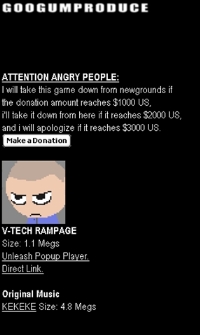 A 21-year old Sydney man, Ryan Lambourn, has sparked outrage by creating a game based on the Virginia Tech Massacre. The game, called V-Tech Rampage, is far from technically impressive, but has nevertheless understandably upset quite a few people. One of the real difficulties is that while there have been a number of important political games and simulations which have tried to ‘speak’ about political issues (from September 12 to Donkey John to World Without Oil) this game – if it does have a point – really doesn’t make that clear. Over at Joystiq, the creator of the game based on the Columbine Massacre is quoted, citing his disappointment with the V-Tech game:
A 21-year old Sydney man, Ryan Lambourn, has sparked outrage by creating a game based on the Virginia Tech Massacre. The game, called V-Tech Rampage, is far from technically impressive, but has nevertheless understandably upset quite a few people. One of the real difficulties is that while there have been a number of important political games and simulations which have tried to ‘speak’ about political issues (from September 12 to Donkey John to World Without Oil) this game – if it does have a point – really doesn’t make that clear. Over at Joystiq, the creator of the game based on the Columbine Massacre is quoted, citing his disappointment with the V-Tech game:
Danny Ledonne, creator of Super Columbine Massacre RPG, writes on Lambourn’s site, “It would appear to me that Ryan has no intention of doing much other than making money and gaining immediate recognition after the Virginia Tech shooting. Inevitably, comparisons between SCMRPG and VTech Rampage are being made right now. Some bloggers despise both games equally whereas others recognize a level of commentary that SCMRPG attempted which was not evident in VTR. For myself I wish to point out that SCMRPG was never a for-profit endeavor and thus I never posted statements like that which is on the VTR game’s homepage”
Adding fuel to the Lambourn posted a notice say he would only remove the game if he received $2000 in donations. This sparked even more vitriolic comments on the game, but in those comments Lambourn defends the donations statement, say it was a further aspect of satire:
PiGPEN – May 15th 2007
Danny, the donation thing is there as a joke against all the people commanding me to take my game down. I didnt think anyone would donate money to it and so far my paypal account has proven me right (BUT I COULD USE SOME FUCKING MONEY THANKS!).
And i’d appreciate if you didnt use the name “Ryan”. That name is reserved for my close friends and family… i cant help the people that gleaned personal information from my website but i would hope you would have the courtesy to not disrespect me in such a manner on my own website…Danny.
Of course, the irony of courting controversy and then being surprised when it results in negative public sentiment (and the post of Lambourn’s full name, address and phone number in numerous locations online) is pretty thick. On the web, even thought two wrongs don’t make a right, they’re never far from each other!
See The Age for more details.
Update (17 May, 2:25pm): The ‘official’ version of the game hosted by Lambourn (and this whole website) have been taken down. (That said, given the nature of digital culture, if anyone looked I’m sure they’d find another copy somewhere…) Lambourn’s website now sports a “This Account Has Been Suspended” notice.
Update 2 (4 June 2007): After reviewing the case, Australia’s Office of Film and Literature Classification gave the game an MA15+ rating, not banning the game as had been suggested.
Six Twitter Questions
Last week danah boyd posted a few questions about Twitter use. Since I answered each one in my head, I figure I’d post my answers here on the (very off) chance someone else is interested in my answers. danah’s questions are in italics …
First, the practical question. Can i quote you?
[X] Yes, and you *must* use my real name.
1. Why do you use Twitter? What do you like/dislike about it?
I love the immediacy of Twitter. I also like the fact that since Tweets are so small, people often write more personal things, letting you – over time – build a more holistic sense of them as a person not just as an academic (or whatever role that person has as their more careful public face, the face that is often more carefully maintained through other forms, such as blogging).
I don’t like the fact that, so often, I turn to Twitter only when I’m trying to procrastinate or distract myself from what I should “really” be doing!
2. Who do you think is reading your Tweets? Is this the audience you want? Why/why not? Tell me anything you think of relating to the audience for your Tweets.
I’ve got two discernable groups – firstly, Perth folks who Twitter and who knowingly form a sort of semi-web2.0 ensemble (the same folk you’d see at Perth Blog Meetups); secondly my academic and pseudo-academic ‘friends’ (and I use the quote marks since I’ve not physically met a number of the people I’d imagine in this category) who I share some interests with – be it digital culture, film, participatory culture or some combination thereof. These are both the people I imagine are reading me (or have subscribed to my Tweets) and also the people I read.
3. How do you read others’ Tweets? Do you read all of them? Who do you read/not read and why? Do you know them all?
As at 2. The only time I read new Tweets, now, is when someone I’m already reading either points to someone/something interesting or is engaged in one side of an interesting conversation and I want to hear the other half!
4. What content do you think is appropriate for a Tweet? What is inappropriate? Have you ever found yourself wanting to Tweet and then deciding against it? Why?
Inappropriate is a hard call – I’ve seen all sorts of colourful language and that seems in keeping with the immediacy and personal aspects of Twitter, but at the same time I wonder if those, aggregated, would be the sort of thing people want to be a reflection of themselves. I guess links to porn or other potentially offensive material has to be flagged as such – the use of TinyURLs means you’re less able to predict the contents of a link by it’s URL and so the onus (I think) is on the Twitterer to make it clear what they’ve linking to.
5. Are your Tweets public? Why/why not? How do you feel about people you don’t know coming across them? What about people you do know?
Mine are at present. I’m considering making them private as I’ve caught myself (only once so far) writing and then deleting a Tweet since it was venting about the workplace and the workplace could – at some distant point in the future – notice. That said, I’m never really sure how private ‘private’ turns out to be.
6. What do i need to know about why Twitter is/is not working for you or your friends?
Twitter, to me, works best in tandem with other forms. Most of the Twitterers and Twitterati I read are already bloggers, but their Tweets add a level of personality and personal depth which often isn’t visible in their blog posts (which are often more careful, especially because blogs and ‘personal profiles’ so often are synonymous in academia).

